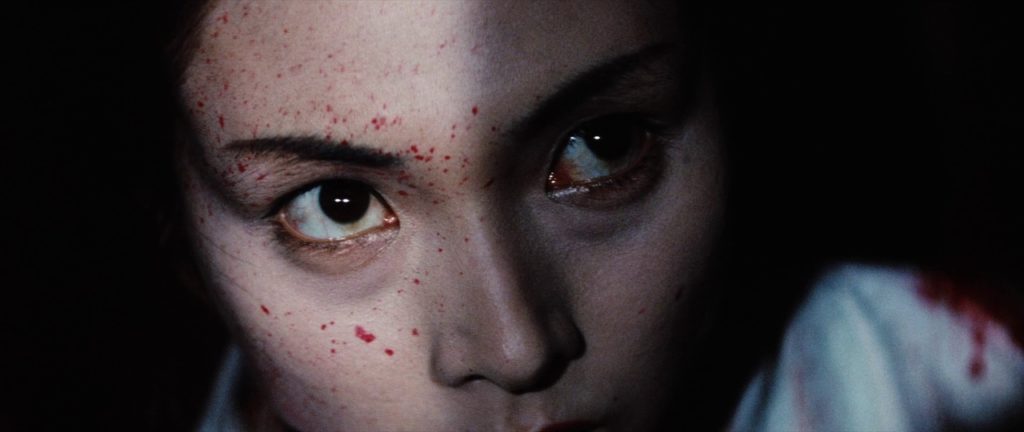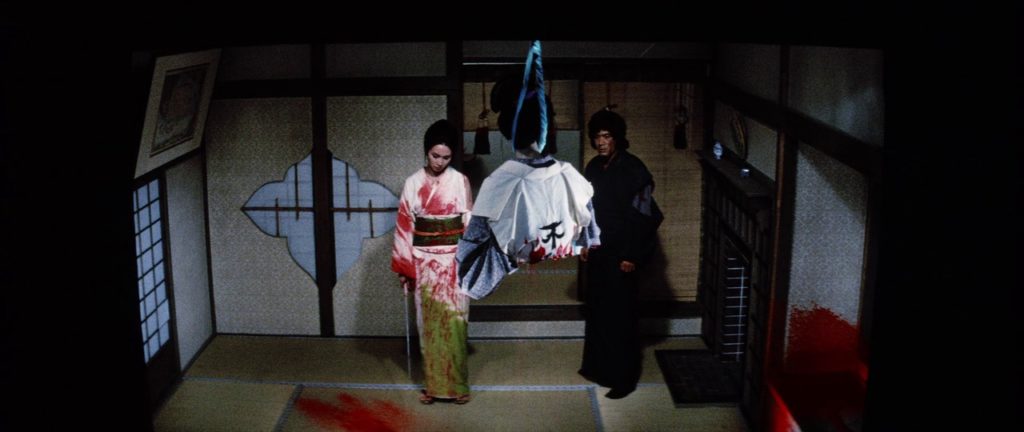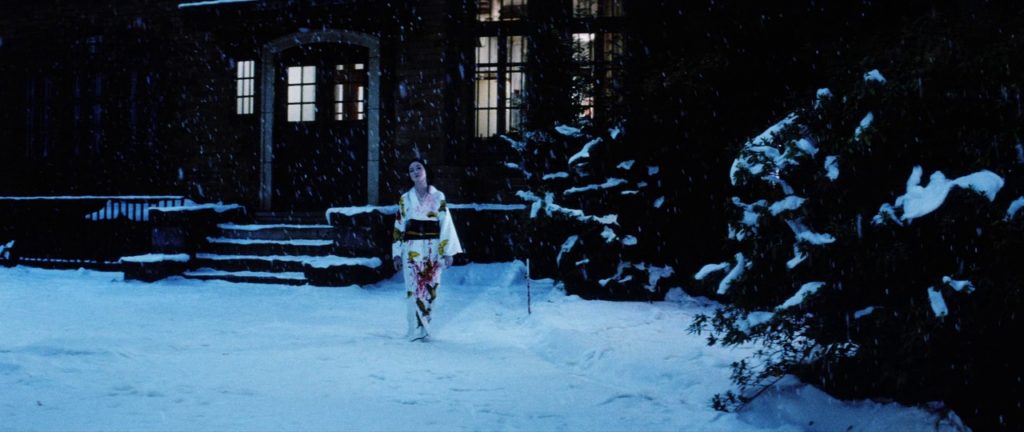| Rowan Smith |

Lady Snowblood plays at the Trylon Cinema from Friday, June 2 through Sunday, June 4. Visit trylon.org for tickets and more information.
“The more virgin our eyes are, the more we have to say. The most detestable habit in all modern cinema is the homage. I don’t want to see another goddamn homage in anybody’s movie.”
—Orson Welles[1]
Despite my strong desire to fight against the impulse throughout my teens and twenties, I’ve always been governed more by emotion than logic. I cannot deny that I become bloodthirsty when I am wronged, despite the god knows how many revenge-centric films I’ve watched, murder ballads I’ve heard, and their tendency to say the same thing: there is no catharsis. Despite knowing with complete certainty that revenge will not give me what I seek, I cannot overcome my desires through logic and rational reasoning alone. I feel like many people probably feel the same way. Personally, I often find myself seeking justice in the car, finding myself in petty interactions of “justice” where I become some sort of highway vigilante, or at least this is how I see it in my mind’s eye, dispensing retribution to those who drive in a way that I find unacceptable. As I have gotten older, I have stopped allowing myself to engage in these impulses as much as I did when I was young, but the urge still remains.
Revenge is a dish best served cold, we are told via quote at the outset of the longest film by Hollywood’s greatest homage maker. For most of my life, vengeance was one of my favorite propellers in stories. A character motivated by revenge is a character assured of destruction, and thus a character I have historically related to. It doesn’t matter that virtually all of these stories have the same thing to say about vengeance—that it’s something that everyone already knows about vengeance, even those who are compelled by it.

For most, the path of vengeance is a choice. However, we never see Lady Snowblood choose, which is something that separates the eponymous film from many other revenge films. Lady Snowblood has no identity. She has no personality. She was a tool of vengeance already when she was born. I wonder who she would be without the vengeance she carries. She was never given a choice, never given a chance to be a person. In a few moments of vulnerability we can see the longing in her eyes for a life that means more than this. Meiko Kaji’s intensely expressive eyes become windows into the character, giving the performance a depth that transcends most of what people would call “exploitation” cinema. Because of this, when Lady Snowblood repeatedly walks the path of self-destruction, we know that this is not a true choice. She herself is already destroyed. In her eyes, there is nothing left to do but destroy further.
As I look at myself and the way the desires of characters I relate to have changed in recent years, I find myself less drawn to revenge. I think this is because, for most of my life, I was deeply drawn to the desire of a character to destroy everything around them including themselves (right up there with the unshakable need to know) but now I no longer see myself reflected in these characters. There is something really beautiful about feeling resonance with a character, feeling seen, seeing yourself reflected on a screen. This is catharsis, I think. Moreso than vengeance is, at the very least. But watching Lady Snowblood, or Kill Bill, or Oldboy, or Ms. 45, or Martyrs, or Irreversible, or countless others, I no longer feel resonance. I feel only the cold and empty pit of despair, the feeling of the last candle being snuffed out and the world being plunged into darkness.

I think this shift within myself is part of why I find it somewhat detestable that we can no longer extricate this film from QT, a filmmaker I loved deeply when I first fell swooningly head-over-heels for cinema as a thirteen year old boy, just around the time that Kill Bill came out. My feelings for him have gone tepid over the years. I feel Orson Welles’s words I included above cutting both ways. When I was young and my eyes were unclouded I was dumbfounded by the amazing things Tarantino’s films contained. The older I get and the more films he has borrowed from I watch, the less impressed I am with his work. There is great merit to Lady Snowblood, and obviously QT agrees, but I don’t feel like his films internalize many of the important aspects of the films they are drawing on. Most of the things QT borrows are purely superficial: sets, costumes, arterial sprays. The core of Lady Snowblood, though, the essence of its message, is seemingly absent from Kill Bill. The implication at that film’s conclusion is that once you’ve killed all the people who have wronged you, you will finally be free and happy. The ending of Lady Snowblood feels much more true to the hollow nature of revenge. All she knows is violence. She achieves what she wants, but at the cost of her own humanity. She cannot be human.
Vengeance is the lost cold slug of the heart of man.
Vengeance is the crushed foot of man limping backwards into the dark woods.
Vengeance is the stone fist of the dried seed pod
Vengeance is the deer tick swollen large
Vengeance is the last gaping maw of earth’s final desire
Vengeance is the cracked window view of the dusty narrow trail
Vengeance is the split trunk of the tree swallowed whole
I am the angel of death
I am the angel of death
I a
m the a
ngel of de
ath.
NOTES
[1] Orson Welles, “Orson Welles gives a talk at a Paris film school (1982) – Part 2,” YouTube video 0:44, https://www.youtube.com/watch?v=tRPnDEF9KTw
Edited by Olga Tchepikova-Treon
